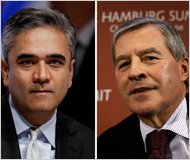The government reports on Thursday suggested an acceleration in job growth in early August and hinted at pockets of pricing power in the sluggish economy, which could ease concerns among some Fed officials that inflation was too low.
While data on manufacturing was less encouraging, economists were little fazed and said it merely suggested the improvement in factory activity was slower than had been anticipated.
“It looks like the weakness in employment last month was a fluke and the breadth of gains in CPI suggest that there will be less push back against tapering because of low inflation,” said Ryan Sweet, a senior economist at Moody’s Analytics in West Chester Pennsylvania. “A September taper is still on the table.”
The U.S. central bank has said it plans to start trimming the $85 billion in bonds it is purchasing each month to keep borrowing costs low later this year.
Shares on Wall Street fell and yields on U.S. Treasuries jumped to a two-year high on the data. The dollar briefly climbed to a near two-week peak against the euro.
First-time applications for state unemployment benefits dropped 15,000 to a seasonally adjusted 320,000, the lowest level since October 2007, the Labor Department said. Economists had expected initial claims to come in at 335,000 last week.
The four-week moving average for new claims, which irons out week-to-week volatility, fell to its lowest level since November 2007, offering hope of an improvement in labor market conditions after hiring slowed a bit in July.
Carl Riccadonna, a senior economist at Deutsche Bank Securities in New York, said new claims and the four-week average at pre-recession levels were consistent with a pick-up in the pace of hiring, if not in August, then some time in the next couple of months.
“The critical component is going to be the August jobs report. If that comes in at least where it was in July, then this is going to keep the Fed on track to initiate tapering at the September (policy) meeting,” said Riccadonna.
Employers added 162,000 jobs to their payrolls last month, with the jobless rate hitting a 4-1/2 year low of 7.4 percent.
BROAD GAINS IN PRICES
In another report, the Labor Department said its Consumer Price Index rose 0.2 percent, in line with economists’ expectations, as the cost of goods and services ranging from tobacco to apparel and food increased.
The CPI had increased 0.5 percent in June. In the 12 months through July, the CPI advanced 2.0 percent, the largest increase since February, after increasing 1.8 percent in June.
The push in inflation to the Fed’s 2 percent target suggested the downward drift in prices seen early in the year was over and could comfort some central bank officials who have warned on the potential dangers of inflation running too low.
Stripping out energy and food, consumer prices rose 0.2 percent for a third straight month. That took the increase over the past 12 months to 1.7 percent after core CPI gained 1.6 percent in June.
The uptick in prices fits in with Fed Chairman Ben Bernanke’s views that the low inflation was temporary. Last month, there were also increases in the prices of gasoline, transportation and shelter.
Medical care services recorded a second successive month of gains in July. Medical care, which makes up about 10 percent of the core CPI, had been subdued in April and May.
The lack of pressure on health care costs had been attributed to the expiration of patents on several popular prescription drugs and government spending cuts that have cut payments to doctors and hospitals for Medicare.
Furniture prices posted their largest decline in three years, while airline fairs fell for second straight month.
News on the factory sector was a bit downbeat, with the Fed reporting that manufacturing output slipped 0.1 percent last month, held down by a 1.7 percent fall in the production of motor vehicles and machinery.
That, together with a drop in utilities production, left industrial output unchanged in July.
Separately, the New York Federal Reserve said its “Empire State” general business conditions index fell to 8.24 in August from 9.46 in July. A reading above zero indicates expansion.
However, details of the report were fairly encouraging, with strong gains in labor market gauges. The inventory drawdown continued, which bodes well for future production.
The Philadelphia Federal Reserve, meanwhile, said its business activity index fell to 9.3 in August from 19.8 in July, amid a slowdown in new orders growth and factory jobs.
But economists do not view this survey as a good barometer of national factory activity and were optimistic manufacturing will regain muscle, supported by a strengthening housing market recovery and firming demand overseas which is pushing up domestic exports.
“Growth in Europe and a pop in exports in June suggests we might see production growth resume after a flat first half,” said Mei Li, an economist at FTN Financial in New York.
(Reporting by Lucia Mutikani, additional reporting by Paige Gance in Washington and Steven C Johnson in New York; Editing by Chizu Nomiyama)

Article source: http://www.nytimes.com/reuters/2013/08/15/business/15reuters-usa-economy.html?partner=rss&emc=rss







